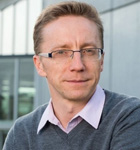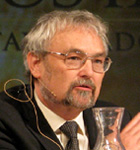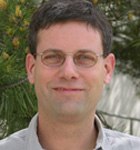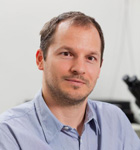| |
 |
|
Center for Integrative Genomics, University of Lausanne, Switzerland |
|
Born in Edinburgh, Richard Benton's studies took him to Cambridge where he obtained his PhD in biology. He worked as a post-doctoral fellow at The Rockefeller University in New York between 2003 and 2007. He then joined the Center for Integrative Genomics at the University of Lausanne as an assistant professor and became associate professor in 2012. Richard Benton studies sensory perception in the model organism Drosophila melanogaster, the common vinegar fly. He wants to decipher the molecular logic of how insects receive chemical signals to distinguish kin, mates, competitors, prey and predators. This involves identifying the receptors in the nose and the neurons in the brain that respond to information insects receive via their sense of smell. Benton tries to understand how a specific substance triggers activity in certain regions of the brain to provoke particular behaviors. |
| |
|
| |
|
| |
 |
|
Department of Experimental Psychology, University of Oxford, UK |
|
Robin Dunbar gained his PhD from Bristol University. He is currently Professor of Evolutionary Psychology at the University of Oxford. He has held Research Fellowships and Professorial Chairs in Psychology, Biology and Anthropology at the University of Cambridge, Stockholm University, University College London, and the University of Liverpool. He is an elected Fellow of the British Academy, and co-Director of the British Academy’s Centenary Research Project. His principal research interests focus on the evolution of sociality in mammals (with particular reference to ungulates, primates and humans). He is best known for the social brain hypothesis, the gossip theory of language evolution and Dunbar’s Number (the limit on the number of relationships that we can manage). His current project focuses on the mechanisms of social cohesion, and uses a range of approaches from comparative analysis to cognitive experiments to neuroimaging to explore the mechanisms that allow humans to create large-scale communities. |
| |
|
| |
|
| |
 |
|
|
Department of Fundamental Neurosciences, University of Lausanne, Switzerland |
| |
Dirk Fasshauer studied biology and received his doctorate at the University of Göttingen in 1994. He worked as a post-doctoral fellow at Yale University from 1995 to 1997 and moved from there to the Max Planck Institute for Biophysical Chemistry. From 2002, he headed the “Structural Biochemistry” Research Group in the Department of Neurobiology. In 2009, he joined the Department of Cell Biology and Morphology, now the Department of Fundamental Neurosciences, at the University of Lausanne as an associate professor. His group focuses on a structural and functional description of the protein machinery that drives the calcium-dependent release of neurotransmitters from synaptic vesicles. Ultimately, he is interested in the evolutionary development of the machinery because its core elements are highly conserved among all eukaryotes and throughout the cell |
| |
|
| |
|
| |
 |
|
|
Max Planck Institute of Molecular Cell Biology and Genetics, Dresden, Germany |
| |
Wieland Huttner studied medicine in Oxford and Hamburg, where he obtained his doctorate in 1976. After a post-doctorate at the Max-Planck-Institute for Experimental Medicine in Göttingen and at Yale University, he returned to Germany in 1981, where he headed a junior research group at the Max-Planck-Institute of Psychiatry in Munich. In 1985, he became a group leader at the EMBL in Heidelberg and in 1991 he was appointed as Professor and Chair of the Institute for Neurobiology at the University of Heidelberg. Currently he is Director and Research Group Leader at the Max-Planck-Institute of Molecular Cell Biology and Genetics in Dresden, Germany. His research focuses on the molecular and cellular mechanisms underlying the evolutionary expansion of the neocortex. His research group compares the molecular characteristics of neural stem and progenitor cells in liss- and gyrencephalic mammalian species to obtain insight into their differential proliferative potential. This molecular approach has led to the discovery of various genes involved in the neocortical expansion during mammalian evolution. |
| |
|
| |
|
|
 |
|
Max Planck Institute for Developmental Biology, Tübingen, Germany |
| |
Gáspár Jékely obtained his PhD in genetics at the Eötvös Loránd University in Budapest. He then worked as a post-doctoral fellow at the EMBL in Heidelberg from 2000 to 2002 in the laboratory of Pernille Rorth and moved from there as Junior fellow to the Institute for Advanced Study at the Collegium Budapest. In 2004, he moved again to the EMBL in Heidelberg to work in the laboratory of Detlev Arendt. Since 2007, Gáspár Jékely is leading a Research Group at the Max-Planck-Institute for Developmental Biology in Tübingen. Using an interdisciplinary approach, his research aims at identifying the molecular and circuit bases of behavior in a marine invertebrate model organism, the annelid Platynereis. As a ‘living fossil’, Platynereis can help to shed light on how animal nervous systems evolved at the dawn of animal life and diversified during the 'Cambrian explosion', one of the most spectacular events in the history of life. |
| |
|
| |
|
| |
|
|
 |
|
Evolutionary Neurobiology, University of California, Davis, USA |
| |
Leah Krubitzer is Professor at the Department of Psychology and Center for Neuroscience at the University of California, Davis. She attended Pennsylvania State University where she received a BS degree, and did her graduate work at Vanderbilt University, where she received her PhD in Physiological Psychology. She spent over six years in Australia, at the University of Queensland where she studied a number of primitive mammals including the duckbilled platypus and the spiny ant eater. Leah Krubitzer is interested in how complex brains, such as those in humans, are built from simpler forms. Her work examines the anatomical connections and electrophysiological properties of neurons in the neocortex, the portion of the brain responsible for perception, cognition, learning, and memory. Through comparative studies, it is possible to determine which features of the neocortex are shared by all mammals, and how new features have been added during morphological or behavioral specialization. In this way, she can reconstruct the evolution of the neocortex and its relationship to functional changes. Her work accounts for the remarkable diversity in mammalian behavioral and perceptual abilities through the action of a few evolutionarily old developmental mechanisms. While constraining evolutionary change, these mechanisms have also provided the variation needed for such diversification. |
| |
|
|
 Back to "Previous .."
Back to "Previous .."